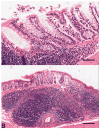A mineral-rich red algae extract inhibits polyp formation and inflammation in the gastrointestinal tract of mice on a high-fat diet
- PMID: 20150219
- PMCID: PMC2861409
- DOI: 10.1177/1534735409360360
A mineral-rich red algae extract inhibits polyp formation and inflammation in the gastrointestinal tract of mice on a high-fat diet
Abstract
The purpose of this study was to determine whether a mineral-rich extract derived from the red marine algae Lithothamnion calcareum could be used as a dietary supplement for chemoprevention against colon polyp formation. A total of 60 C57bl/6 mice were divided into 3 groups based on diet. One group received a low-fat, rodent chow diet (AIN76A). The second group received a high-fat "Western-style" diet (HFWD). The third group was fed the same HFWD with the mineral-rich extract included as a dietary supplement. Mice were maintained on the respective diets for 15 months. Autopsies were performed at the time of death or at the completion of the study. To summarize, the cumulative mortality rate was higher in mice on the HFWD during the 15-month period (55%) than in mice from the low-fat diet or the extract-supplemented high-fat diet groups (20% and 30%, respectively; P < .05 with respect to both). Autopsies revealed colon polyps in 20% of the animals on the HFWD and none in animals of the other 2 groups (P < .05). In addition to the grossly visible polyps, areas of hyperplasia in the colonic mucosa and inflammatory foci throughout the gastrointestinal tract were observed histologically in animals on the high-fat diet. Both were significantly reduced in animals on the low-fat diet and animals on the extract-supplemented HFWD.These data suggest that the mineral-rich algae extract may provide a novel approach to chemoprevention in the colon.
Conflict of interest statement
All named authors of the original research paper entitled “A Mineral-Rich Red Algae Extract Inhibits Polyp Formation and Inflammation in the Gastrointestinal Tract of Mice on a High-Fat Diet” express that there exist no financial and/or personal relationships with other people and/or organizations that could inappropriately influence their work.
Figures


References
-
- Baron JA, Beach M, Mandel JS, van Stolk RU, Haile RW, Sandler RS, Rothstein R, Summers RW, Snover DC, Beck GJ, Bond JH, Greenberg ER. Calcium supplements for the prevention of colorectal adenomas. Calcium Polyp Prevention Study Group. N Engl J Med. 1999;340:101–107. - PubMed
-
- Kampman E, Slattery ML, Caan B, Potter JD. Calcium, vitamin D, sunshine exposure, dairy products and colon cancer risk (United States) Cancer Causes Control. 2000;11:459–466. - PubMed
-
- Grau MV, Baron JA, Sandler RS, Haile RW, Beach ML, Church TR, Heber D. Vitamin D, calcium supplementation, and colorectal adenomas: results of a randomized trial. J Natl Cancer Inst. 2003;95:1765–1771. - PubMed
-
- McCullough ML, Robertson AS, Rodriguez C, Jacobs EJ, Chao A, Carolyn J, Calle EE, Willett WC, Thun MJ. Calcium, vitamin D, dairy products, and risk of colorectal cancer in the Cancer Prevention Study II Nutrition Cohort (United States) Cancer Causes Control. 2003;14:1–12. - PubMed
-
- Flood A, Peters U, Chatterjee N, Lacey JV, Jr, Schairer C, Schatzkin A. Calcium from diet and supplements is associated with reduced risk of colorectal cancer in a prospective cohort of women. Cancer Epidemiol Biomarkers Prev. 2005;14:126–132. - PubMed
Publication types
MeSH terms
Substances
Grants and funding
LinkOut - more resources
Full Text Sources
Medical

